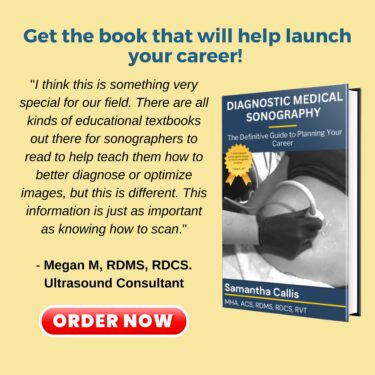Diagnostic medical sonography is a rapidly growing field within the healthcare industry. Sonographers, also known as ultrasound technologists, play an important role within modern medicine. Using special technology that emits sound saves, they take images of the inside of the body, which are then interpreted and used by referring physicians to detect, diagnose and treat disease, as well as monitor the health and growth of a fetus.
Sonography is growing career choice in part due to the high demand and relatively high pay. Entry-level positions are available with just an Associate of Science degree, and it’s one of the highest paying positions available with that level of education.
How to Become an Ultrasound Tech in Nebraska in 2025
- Choose an Accredited Ultrasound Program and Apply. It’s important to choose an accredited program, preferably one that has been accredited by the CAAHEP. Nebraska has 3 schools that have received their programmatic recognition. Research the prerequisites to be sure you are prepared to apply.
- Complete Your Degree. The minimum degree required to be a sonographer is an Associate of Science in DMS. Some schools offer Bachelor’s degree programs, and there are accelerated certificates available to those who meet the educational and experiential prerequisites.
- Get Your Credential. Certification from the ARDMS will be required by your future employer, so make sure the educational program you’re going to attend will prepare you to sit for their exams.
Connect with Educational Programs near You
Why Choose a CAAHEP Accredited Diagnostic Sonography Program?
 When a program becomes accredited, it means that it has been evaluated by an outside agency and been found to meet their educational requirements.
When a program becomes accredited, it means that it has been evaluated by an outside agency and been found to meet their educational requirements.
The most widely recognized organization that accredits sonography programs is the Commission on Accreditation of Allied Health Education Programs (CAAHEP). A school receives accreditation from the CAAHEP once it has met their DMS Accreditation Standards and Guidelines. The school also has to pass a series of program reviews, including a self-study review and a site visit. This ensures that the school is able to provide a quality education to their students so they’re prepared to enter the healthcare workforce.
The successful completion of a CAAHEP recognized Nebraska DMS program is the most comprehensive and direct way students can earn eligibility to sit for the ARDMS Sonography Principles & Instrumentation (SPI) exam.
If you’re currently enrolled in or have been accepted to a CAAHEP accredited program, you’re also eligible to apply for the UltrasoundSchoolsInfo $1,000 scholarship.
Accredited Sonography Schools in Nebraska in 2025
The following schools have all been accredited by CAAHEP and offer certificates or degrees in medical imaging as of October 2023:
| School | Programs Offered | Prerequisites | How to Apply |
|---|---|---|---|
| Bryan College of Health Sciences 1535 S 52nd St Lincoln, NE 68506-1398 |
Bachelor’s of Science in either General Sonography or Adult Cardiac/Vascular Sonography | 2.75 high school GPA, or 2.5 post-high school GPA required for admission | Applications due by January 15th of each year |
| Nebraska Methodist College 720 North 87th Street Omaha , NE 68114-2852 |
AAS and Bachelor’s degrees in Diagnostic Medical Sonography | Certain college-level prerequisites with a minimum 2.75 GPA. Job shadowing is recommended. | Essay must be submitted with application. |
| University of Nebraska Medical Center 984545 Nebraska Medical Center Omaha, NE 68198-4545 |
Bachelor of Science in Medical Imaging OR Professional Certificate. Optional tracks include General or Cardiac Sonography | Prerequisites vary depending on degree program chosen. | Applications are due by January 15th of each year. |
| * This information is obtained from a number of sources, is provided without charge, and is believed to be accurate. Please contact us with updates. | |||
Nebraska Student Scholarships and Awards
Financing an education is one of the more stressful aspects for students and their families. There are grants, loans, scholarships, and awards that students are able to apply to, and it’s important to understand the difference and how they will affect your financial situation. Visit our financial aid portal to learn more.
Below are just a few of the scholarships and awards available to students in Nebraska who qualify:
Ultrasound Schools Info
Award: $1,000
Eligibility: Aspiring sonographer currently enrolled in/accepted to a CAAHEP accredited DMS program.
How to Apply:
Ultrasound Schools InfoAttn: Scholarship Committee
PO Box 3026, Bellingham, WA 98227
scholarship@ultrasoundschoolsinfo.com
Horatio Alger Association Career and Technical Scholarships
Award: $2,500
Eligibility: Awarded to students pursuing a career or technical education at an accredited institution who have overcome great adversity.
How to Apply: Complete the online application.
The Susan Thompson Buffett Foundation
Award: Varies
Eligibility: Awarded to first-time Freshmen entering college from a Nebraska high school who demonstrate financial need.
How to Apply: Create a login and apply online.
The Alan D. Waggoner Sonographer Student Scholarship Award
Award: $1,000
Eligibility: Students attending a CAAHEP accredited program with an interest in echocardiography and leadership.
How to Apply:
American Society of EchocardiographyThe Society for Cardiovascular Ultrasound Professionals
2530 Meridian Parkway, Suite 450
Durham, NC 27713
919.861.5574
How Much do Ultrasound Techs Make in Nebraska?
The mean annual salary for sonographers working in Nebraska in 2023 was $80,900, or $38.89 an hour according to the Bureau of Labor Statistics (BLS). Top earners in the 90th percentile of their profession earned a mean salary of $97,780 a year, while those in the bottom 10th percentile made an average annual wage of up to $62,000. Conditions in your area may vary. In addition, job availability for sonographers in Nebraska is expected to increase by 12% by 2030 (O*Net).
The salary you earn can depend on a number of factors, including type of employer, level of education and experience, and geographic location. For example, outpatient care centers tend to pay the most, while larger imaging centers and hospitals typically offer competitive benefit programs as well as a base salary. Receiving an Associate of Science Degree is required to become an entry level sonographer, while earning a Bachelor’s Degree can help you qualify for higher paying job positions.
Certification Requirements in Nebraska
Most states, including Nebraska, do not currently require their diagnostic medical sonographers to carry a specific credential or license. It is almost certain, however, that your employer will.
The most widely accepted certification is provided by the American Registry for Diagnostic Medical Sonography (ARDMS). The only way to earn their certification is by taking and passing their exam. In order to qualify, you must meet one of their prerequisites, one of which is to obtain your degree from a CAAHEP accredited program. Once you have, you can take the exam at one of the two testing locations in Nebraska:
- 3506 N 147th St #202, Omaha, NE 68116
- 300 N 44th St #104, Lincoln, NE 68503
Additional Certification Information
Certification overview
About the ARDMS
Ultrasound Technician Schools in Omaha
 The economy in Omaha, Nebraska has fared better than in many other metropolitan areas, and many of the large medical facilities in the area are hiring. Job growth is expected to be strong across the healthcare industry, not only for sonographers but for many of the allied health fields as well. Get started today by requesting information from one of the following CAAHEP sonography programs in Omaha:
The economy in Omaha, Nebraska has fared better than in many other metropolitan areas, and many of the large medical facilities in the area are hiring. Job growth is expected to be strong across the healthcare industry, not only for sonographers but for many of the allied health fields as well. Get started today by requesting information from one of the following CAAHEP sonography programs in Omaha:
Nebraska Methodist College
University of Nebraska Medical Center
Frequently asked questions
What does an ultrasound technician in Nebraska do?
Sonographers do much more than just image internal organs. They also work closely with other members of the healthcare team and patients, and evaluate the images they capture. Learn more on our ultrasound technician career overview page. Get a complete job description, as well as first-hand accounts of what it’s like to be a sonographer.
How do I get started as a medical sonographer in Nebraska?
We’ll walk you through all of the steps, starting when you’re still in high school or before you’ve started a formal post-education program, all the way through finding a job and advancing in your career. Get Started Now
How long do I have to go to school?
Most degree programs are completed within two years, which will allow you to earn an Associate Degree, though program lengths may vary depending on particular program requirements. You can also go to school longer and receive a Bachelor’s or Master’s Degree, which may allow you to advance your career and increase your salary.
How do I know if sonography is right for me?
In order to be successful in the field, you’ll need more than just technical knowledge. Click here to find out about the qualities that make a great sonographer.
What other jobs can I get in healthcare?
There are many careers available within the healthcare industry other than diagnostic sonography, and we’ll introduce you to many of them here


